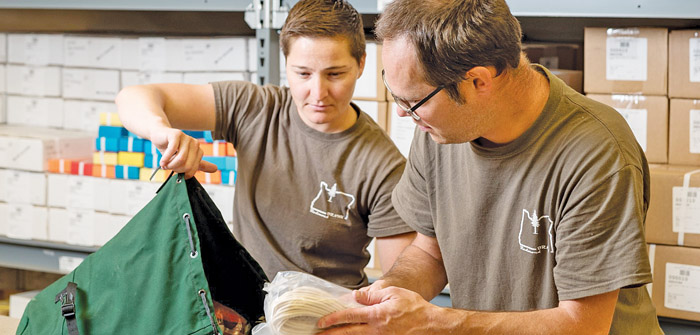(Photo above, Courtesy of Benjamin Edwards)
Identifying and leveraging individual skills is one of the keys to a successful working partnership between great companies and talented employees with intellectual disabilities (I/DD). When putting those skills to work, customized employment is a proven strategy that more and more employers are integrating into their work place, and with good reason. Customized employment can take many different forms, and each is designed to help businesses of all types and sizes get things done in a way that makes the most of each employee’s strengths.
Also known as job carving, customized employment helps employers build flexibility into the creation and assignment of various jobs, which increases business productivity and employee engagement. This can be done in a number of ways with just a little thought and creativity. For example, an employee might have more responsibilities than he or she can effectively manage on a day to day basis. This is a common issue, especially in smaller companies where employees tend to wear a lot of different hats. With customized employment, some of those responsibilities can be reassigned, taking the burden off one employee and helping another to excel. Another scenario is that a specific job description may include a few tasks where the assigned employee is not completely proficient. Perhaps it’s an office support person who is great on the phones and greeting people in person but finds that filing paperwork and taking inventory of office supplies are not strong suits. Those tasks can be shifted to another employee who has competency in those areas, giving both employees the opportunity to play to their strengths and find satisfaction in their work.
Another way to consider using customized employment is through job creation, which often comes into play when employers need to boost their workforce, either seasonally or in order to take on and complete a particular project. Jo-Al with the U.S. Forest Service is a local employee who has benefited from job creation. During the height of fire season, Jo-Al is on the job at the Northwest Fire Cache in Redmond. He works several hours a week during this busy time of year, managing inventory, performing quality checks, and packing kits to keep firefighters on the front line safe, effective and prepared. Jo-Al uses his attention to detail to play a critical role as part of a larger team that is focused on providing support to those on the lines of local, regional and national fire incidents. Job creation can also resolve an issue most employers have in common — those nagging, ongoing tasks that need to get done but continually fall through the cracks. Whether it’s shredding documents or re-shelving inventory, creating a position that specifically tackles those needs can streamline efficiencies and provide rewarding, satisfying work for individuals who are eager to put their time and talents to good use.
Job sharing is a third form of customized employment and it has taken on a new definition. Instead of having two part time workers share all the tasks of a full-time position, the responsibilities of that single position are divided among two or more employees, each taking on the tasks that best match their skills. Job sharing in this definition can be a real win for employers because they have people in place who are perfectly suited for each element of the job. There are usually cost savings associated with job sharing because the employees are working part time, so employers are not paying for overtime wages or benefits. Job sharing is also a win for employees because the arrangement usually comes with flexible schedules, which means they have time to pursue other interests.
Customized employment can be applied to a wide range of situations, but it is not about creating irrelevant positions or finding menial, short term tasks. Rather, it is a proven strategy that helps companies meet demands, improve work flow, scale their needs accordingly, and boost employee morale by leveraging each person’s strengths. It is also an effective way to integrate employees with I/DD into the work place because it allows them to focus their talents on the task at hand so they can earn a sustainable income and contribute to the success of the company in a meaningful way.
For more information about the role customized employment can play in supporting your diverse workforce, visit www.employmentfirstcentraloregon.org. You’ll find a list of local agencies who can help you hire excellent candidates for your next job vacancy.





